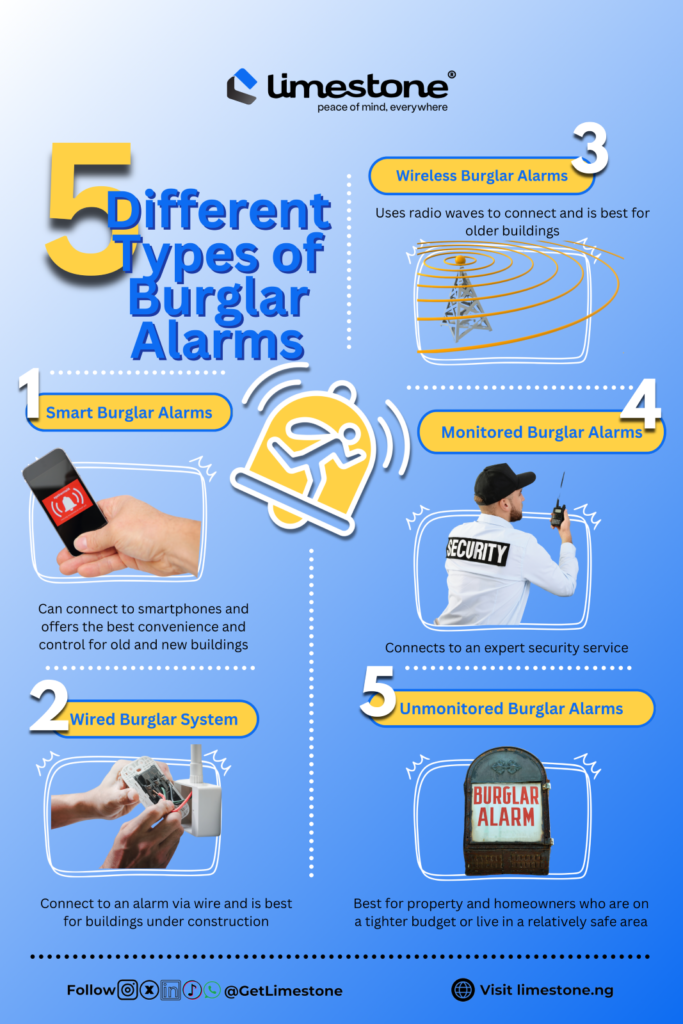
Do you lie awake at night, worrying about the safety of your properties and loved ones? Do you fear the devastating consequences of a break-in? You’re not alone. Home burglaries are generally a distressing reality. Fortunately, burglar alarms are a good solution to this problem
They provide the assurance that your home is protected with a reliable security system giving several good nights rests. That’s the power of a well-chosen burglar alarm system.
A burglar alarm is a security system designed to detect intrusion and deter potential burglars. It’s your home’s silent guardian, standing watch even when you’re away. In this comprehensive guide, we’ll help you choose the perfect system to protect your home and achieve true peace of mind.
How Burglar Alarms Generally Work
A burglar alarm is a network of intelligent devices working together to protect your home against burglaries. Let’s know the key components and how they ensure the alarm functions:
- Sensors:
Burglar alarm system uses special devices called “sensors” to see, hear, and even feel what’s happening in your home. There are various types, and you can place them in different areas to detect any suspicious activity.
For example, you might use the sensor of our smart burglar alarms to detect smoke or carbon monoxide. This will help in case of a pipe, fire or gas leak.
- Control Panel:
The control panel is the central command center, brain, of your smart burglar alarm system. It receives signals from the sensors and decides how to respond. It can activate the alarm to scare off intruders, send a notification to your smartphone to let you monitor what’s happening.
This intelligent hub plays a crucial role in preventing burglary by quickly assessing threats and initiating appropriate responses.
- Keypad:
The keypad is the control center for any burglar alarm. It’s how you interact with the system – arming it when you leave and disarming it when you return. It also has a panic alert button that you can press in emergencies. Even if the system is disarmed, you can instantly trigger the alarm to get help fast.
Many modern keypads have touchscreens and voice control, making them easy to use. And with our latest technology, you can control your alarm remotely from your smartphone.
Speaking of emergencies, it’s crucial to be prepared for any situation. For a comprehensive guide to navigating those unexpected devastating events, download our Ultimate Guide to Emergency Preparedness.
- Siren:
The siren is the voice of burglar alarms. It’s a loud sound that goes off to scare away intruders and let your neighbors know something is wrong. You can place sirens inside or outside your home, and they come in different volumes so you can choose how loud you want it to be.
Today, you can even carry a siren in your pocket.
By downloading the Limestone app, you can access a mobile panic alert that you can trigger when something feels off. This feature sends a real-time alert to your neighbors, community, contact list, and provides your precise location, ensuring a swift response.
Join the Limestone wait list now.
These 4 best burglar alarm components work together to keep your home safe and sound and giving you peace of mind knowing that any suspicious activity will be detected.
The 5 Types of Burglar Alarms
Just like homes come in different shapes and sizes, so do burglar alarms. Each has its features and costs. Here is a breakdown of the main types that can help prevent break-ins:
- Smart Burglar Alarms:
For the modernized homeowner, smart burglar alarms offer the ultimate convenience and control. These alarms connect to your smartphone and other smart home devices via a security app, allowing you to control your security from anywhere and receive instant notifications.
Installation is the simplest. You will need to download a security app and add important contact information. This way, when you are alarmed, and press the panic alert button, all your contacts and neighborhood will know your exact location. Need more clarification? Book a demo here.
These advanced features of smart burglar alarm systems, such as remote monitoring and automation, provide proactive protection against burglaries, making them a valuable investment for enhancing home security.
- Wired Burglar Alarms:
Wired burglar alarm systems are mostly found at the foundation home security. They use wires to connect all the parts of the system, making them incredibly reliable and tough to tamper with. This makes them a great choice for new larger homes or buildings where those wires can be easily hidden within walls and ceilings during construction.
To install one, you’ll need to run wires throughout your home to connect the sensors, control panel, and siren. This is often a complex project, so it is best to get professional help.
Expect to pay more than ₦200,000 or more for basic wired burglar alarms. By creating a physical barrier with sensors on doors and windows, the wired burglar alarm systems effectively deter and prevent burglaries.
- Wireless Burglar Alarms:
If you’re looking for a more accessible installation, wireless burglar alarm systems are the way to go. They use radio waves to communicate, so no need to worry about connecting wires through your walls.
You’ll typically just need to mount the sensors and control panel using screws or adhesive tape. This makes them a good choice for older homes or rentals where running wires might be difficult. Due to its popularity today, the cost of wireless burglar alarms start from around ₦70,000.
These systems offer flexibility and a quick setup, making them ideal for preventing burglaries in various settings.
- Monitored Burglar Alarms:
With a monitored burglar alarm system, you gain extra peace of mind knowing that your home is always being watched over. These alarms are connected to an expert security service. If the alarm goes off, the security officers will be able to contact you, and, if necessary, the government security authorities.
For installation, it varies because the monitored burglar alarms can be either wired or wireless.
However, the alarm needs to be connected to a phone line or internet connection to communicate with the monitoring station. Expect to pay upwards of ₦150,000 for a monitored alarm, plus monthly monitoring fees. The 24/7 monitoring and rapid response of these systems act as a powerful deterrent against burglaries.
- Unmonitored Burglar Alarms:
If you’re on a tighter budget or live in a relatively safe area, an unmonitored burglar alarm might be a good option. These alarms rely on a loud siren to scare off intruders and alert neighbors, but they don’t connect to a monitoring station.
Installation is usually straightforward, and you can find basic systems starting around ₦20,000. While they lack professional monitoring, the loud siren of an unmonitored system can still effectively deter burglaries.

Conclusion
Achieving constant security at home requires more than just alarms; it demands a smart system that can satisfy your safety needs and an enjoyable lifestyle.
So, choose burglar alarms that offer you control through your smartphone and equip you with a secret access security code that can elevate your home security from ordinary to extraordinary.
Ready to learn more about smart burglar alarms for your home? Book a free consultation with Limestone today! Our expertise in security will help you learn about security tech to provide unbeatable peace of mind. After all, a smart burglar alarm is an investment in the security of your loved ones.

